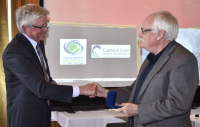
Research For Life recognises Professor Brett Delahunt’s contribution to Medical Research
Research for Life has recognised the contribution Professor Brett Delahunt ONZM FRSNZ has made to medical research by awarding him Honorary Life Membership and presenting him with a medal at its Annual General Meeting, held in Wellington on Monday, 19 November 2018.
Prof. Delahunt, Professor of Pathology and Molecular Medicine at the Wellington School of Medicine and Health Sciences, University of Otago, joined Research For Life’s board and Research Advisory Committee in
Research For Life’s chairman John Nacey said at the AGM, “Brett Delahunt has had a long and productive association with Research For Life. We are indebted to Brett for his leadership of our Research Advisory Committee and the thorough rigorous process he developed and refined for overseeing the process for reviewing and approving grant applications.
“Brett Delahunt is an internationally recognised and prolific medical researcher with a total of 421 publications to date, including 338 in peer-reviewed publications. In October he was awarded the Hercus Medal by Royal Society Te Apārangi for his research on prostate and kidney cancer, the most recent of the numerous awards and accolades he has received over his professional career.
“We are privileged to have Brett as a board member and acknowledge the tremendous contribution he has made to our organisation. That contribution has enabled many young researchers to undertake innovative medical and biomedical research,” John Nacey said.
Established in 1960, Research For Life funds innovative quality research undertaken by researchers in the early stages of their careers.
This year, Research for Life made 11 research grants and 10 travel grants worth $203,698 in total. Grant recipients were from several Wellington institutions including the Malaghan Institute of Medical Research, Victoria University of Wellington’s School of Biological Sciences, the University of Otago’s Wellington School of Medicine and Health Sciences, Massey University Wellington and ESR (The Institute of Environmental Science and Research).
ENDS



